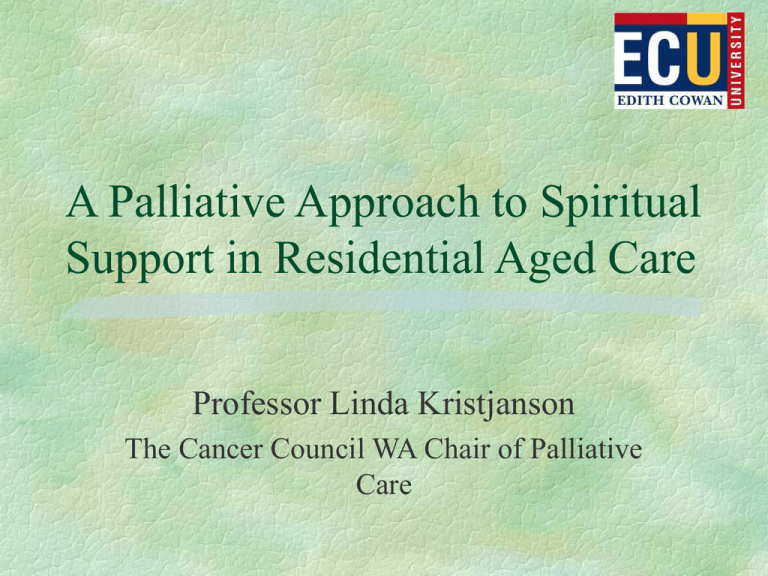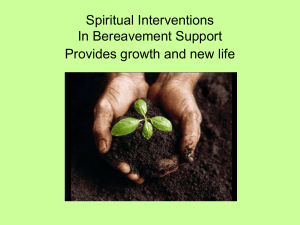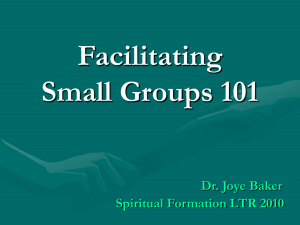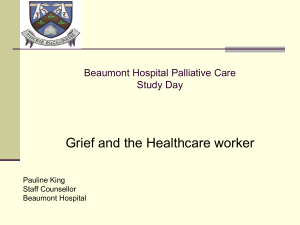A Palliative Approach to Spiritual Support in Residential Aged Care
advertisement

A Palliative Approach to Spiritual Support in Residential Aged Care Professor Linda Kristjanson The Cancer Council WA Chair of Palliative Care Outline Palliative approach in the context of residential aged care Key affecting spiritual care in palliative aged care (eg, dignity, cognitive impairment, bereavement) How to assess spiritual needs and provide spiritual support Palliative Approach Reduces suffering and improves quality of life Embraces an open and positive attitude toward death and dying Palliative Care (WHO, 2003) ‘An approach that improves the quality of life of patients and their families facing the problems associated with life-threatening illness, through the prevention and relief of suffering by means of early identification and impeccable assessment and treatment of pain and other problems, physical, psychosocial and spiritual.’ Need for a Palliative Aged Care Approach RACFs have steadily increased as the sites where death occurs RACFs the residents are more likely to have a diagnoses of dementia, cardiovascular disease, haematological conditions, arthritis, lung disease. Australian Palliative Residential Aged Care Project Australian Department of Health & Ageing www.apracproject.org APRAC Project Component I: Development of national guidelines for palliative care in RACFs Component II: Development of a national education and training program Component III: Options for communication and implementation of the guidelines and the education and training program National Involvement 32 investigators - five states Reference Group National Consultative Network - 800 people Reviewing the Evidence Searches Exclusion Criteria Evaluation Strategies Level of Evidence Quality of Evidence Strength of Evidence Relevance of Evidence Feedback and Testing Steps Educational Survey Delphi Surveys Focus groups - all states and territories National Consultative Network Useability trials Recording and consideration of all feedback Palliative Approach in Aged Care 70% increase in the next 30 years in numbers of frail elderly neurological, musculoskeletal, respiratory, circulatory difficulties and co-morbidities decreased capacity for self care, mobility and communication increase in 75-94 year aged group by 2021 Three Types of Palliative Care Palliative care approach Specialist palliative care teams End of Life Care Spirituality in Residential Aged Care Spiritual beliefs contain tenets about the course of human life and existence beyond it. Impending death prompts spiritual questions Particular challenges given cognitive changes, threats to sense of dignity and meaning, and uncertainties about how to provide bereavement support. Cognitive changes 162,000 Australians with dementia in 2002 estimated 500,000 by 2040 2nd largest cause of disability by 2016 dementia is expected to be primary cause of major chronic illness 30% presently in low care, 60% in high care only 10% of high care residents have no cognitive impairment Advanced Dementia neurological deterioration irreversible swallowing difficulties, weight loss, anorexia, bowel and bladder incontinence, becoming bedridden. estimate that average time from diagnosis of advanced dementia is 2- 3 years Cognitive Impairment & Spirituality Is cognitive function necessary for spiritual life? How does a change in cognitive awareness affect spirituality? How does a loss of cognitive capacity affect communication about spiritual issues? How important is memory to spirituality? How do cognitive limits affect spirituality and spiritual support? Most of our “therapies” are “talk-based” Logic and polite conversations are the norm 80% of communication is non-verbal “There is no such thing as non communicating” (Watzlawick, 1973). Therefore, spiritual support is difficult, but may be possible when usual communication channels are impaired. Connecting in the face of cognitive changes Emotion is discernible Need for closeness and acceptance and positive regard is easy to read Humour and warmth helps glue an interaction together Listen with “third ear”, watch with “third eye” Release from notions of perfection Being fully present in the moment Dignity Dignity is a touchstone of palliative care and is linked to spiritual support Important in the context of spirituality, sense of purpose, meaning, self-worth, and relationships. Threat to one’s sense of dignity and purpose are therefore relevant to spiritual care. Different views of what constitutes dignity. Dignity Support: An Intervention to Support Quality of Life and Ameliorate Distress at the Endof-Life Prof Linda Kristjanson Prof Harvey Chochinov Dr Lynn Oldham Ms Jo Hale Dr Kevin Yuen Dignity Conserving Model of Care Illness/ageing-related issues, Dignity-converting strategies dignity preserving perspectives (eg, outlook, pride, continuity of self, hopefulness) dignity enhancing practices (eg, prayer, meditation, one day at a time) Social dignity inventory eg, aftermath concerns, care tenor Social Support Care Tenor Generativity Dignity Support Aftermath Concerns Continuity of Self Maintenance of Pride Maintaining Hope Role Preservation The Support Approach Taped sessions patients asked to speak about various aspects of their life asked a series of questions based on the dignity model which focus on things that they feel are important or things they would like remembered tape is transcribed, edited and returned as a “life manuscript” provide a legacy for the family, honours the person Results and Experiences Highly effective helps people prepare for death, heighten sense of dignity, increase will to live, helps prepare family for future decreased anxiety, depression sense of purpose/or meaning enhanced foster family communication non-medication related approach that appears promising Aged Care Pilot Study Explore the feasibility of having family and resident participate together in co-constructing a generativity document. Family members will construct the generativity document by proxy. Generativity documents will be provided with the residents and family’s permission to the health care team as a ‘perception altering strategy’, possibly enhancing their appreciation for the resident. Bereavement Support in the Context of Palliative Aged Care - Beliefs & Premises Grief is usually a lifelong and a life changing experience Recent controversy in the literature about how to best provide bereavement support Studies limited by poorly articulated theoretical frameworks, measurement difficulties, and differences in populations and approaches to support offered. Conclusions about best practice clouded by research limits. Bereavement Support Linked to questions of spirituality, meaning, relationships, loss, hope, loneliness, and uncertainty. Stages of grief are now being questioned as is previous language that “judged” the timing and progress of people who are grieving (eg, pathological grief, delayed grief, complicated grief, unresolved grief) Focus instead on integrating grief and loss rather than “getting over it” or “moving on” Enduring Grief Loss becomes part of our biological structure in the shape of grief (Mataurana & Barela, 1992; Goodkin et al, 2001) Grief is a biological experience as well as an emotional, spiritual and cognitive one. As a result, grief becomes an enduring, sometimes relenting, sometimes poignant, but always present part of the life of a person who has lost. Grief Involves Moving Forward by Walking Backwards Grief is about writing a history rather than drawing a map (CS Lewis, 1961) Grief invites us to look back, to remember. We willingly and necessarily in grief, walk back into time and history, recalling when the one who died was physically present. At the same time, we learn how to continue to live and to move ahead. This is a map-less journey. To grieve is to learn the art of “walking backwards” Bereavement Support Challenges Bereavement support for other residents Bereavement support in context of advanced dementia Bereavement support for families Palliative Approach to Loss & Grief in Residential Aged Care Acknowledging the many losses, sorrow and grief Anticipating the enduring and repeating feelings of loss and grief Remaining present Focused attention on the carers and family Accompanying the process of walking backwards, noting the bumps on the road - helping to create a safe passage How do we assess spiritual needs and provide most appropriate support? Spirituality has been found to be a predictor of quality of life Impending death prompts questions about spirituality and meaning Early assessment of need is important Assessment must be ongoing Current, desired practices, attitudes, expectations and beliefs More than a recording of religious affiliation Possible Questions How are you in yourself? What is your source of hope and strength? What are your spiritual needs? Are there ways in which we might help you with your spiritual needs or concerns? Things to observe or look for: Social isolation Depression Questions about meaning of existence Seeking spiritual assistance Attendance at spiritual services Religious items or practices Spiritual Assessment Social/family history may help identify past and present resources for spiritual support Best conducted in a trusting environment by a person with adequate interpersonal skills, conversational style Regular review Respect for spiritual practices Spiritual counselling and support Spiritual Care Assisting residents to articulate those things that are important to them personally Sensitive listening, rather than providing answers Not necessary to share same beliefs Care to not impose spiritual views Awareness of feelings of isolation that may occur at end of life Spiritual Support Silent support Liaison Active Listening Spiritual Care Chaplains and pastoral care workers advocated in the guidelines Recent UK study (N=1500) 73% requested support from someone of the Christian faith 14% from other faiths 67% of RACF manager felt that this would help the resident Team may perceive increased spiritual needs Chaplains/pastoral care workers need to be integral members of the team Guidelines - Spiritual Support A palliative approach supports residents and families to express their unique spirituality. Respecting their privacy and providing an opportunity for them to continue their spiritual practices enhances a resident's spiritual care and their quality of life, as does spiritual counselling. Guideline -Spiritual Support Understanding the resident’s current or desired practices, attitudes, experiences and beliefs by obtaining a comprehensive history, assists in meeting the spiritual needs of a resident, as does a regular review. Guideline -Spiritual Support The aged care team is encouraged to respond in an open, non-judgemental manner to residents’ questions relating to spiritual matters. Involving a chaplain/pastoral care worker with experience and knowledge about these issues is considered best practice. Summary promote the dignity of those for whom we care, maintain a connection and a support to those with cognitive impairment, help families keep their spirits strong amidst layers of accumulative grief and loss, assess respectfully the spiritual needs of residents and how to respond in a way that is helpful, and how do we help support the spirit when bereavement occurs and questions of meaning reemerge? You matter because you are you, and you matter until the last moment of your life. We will do all we can, not only to help you die peacefully, but also to live until you die (Dame Cicely Saunders, 1993).







